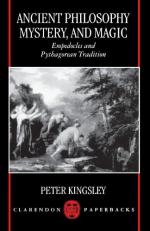|
This section contains 9,768 words (approx. 33 pages at 300 words per page) |

|
SOURCE: Woolford, John. “Arnold on Empedocles.” The Review of English Studies, n.s. 50, no. 197 (February 1999): 32-52.
In the following essay, Woolford interprets Matthew Arnold's Empedocles on Etna as a philosophical debate between Arnold and Empedocles.
Much of Empedocles on Etna is spent defining Empedocles' suicide as the outcome of what is represented as at once a personal and a philosophical crisis. Arnold's own gloss, in a note in the Yale Manuscript, stresses the personal element:
his friends are dead: the world is all against him, & incredulous of the truth: his mind is overtasked by the effort to hold fast so great & severe a truth in solitude: the atmosphere he breathes not being modified by the presence of human life, is too rare for him … his spring and elasticity of mind are gone: he is clouded, oppressed, dispirited, without hope & energy.1
In the poem Empedocles nostalgically recalls the ‘elasticity...
|
This section contains 9,768 words (approx. 33 pages at 300 words per page) |

|


